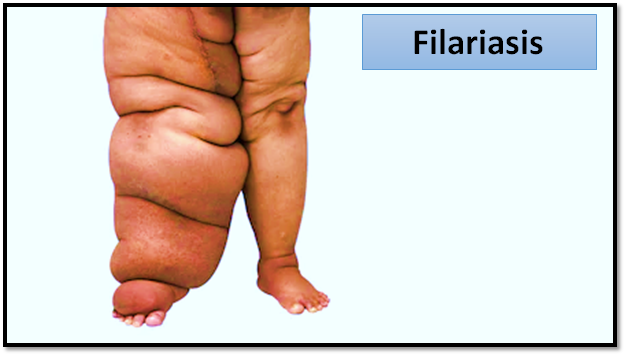Question
Question: Filariasis is also called elephantiasis as- (a)It is caused by ascaris (b)It is caused by elepha...
Filariasis is also called elephantiasis as-
(a)It is caused by ascaris
(b)It is caused by elephant
(c)It is caused entamoeba
(d)Body parts swell
Solution
A neglected tropical disease is lymphatic filariasis, commonly known as elephantiasis. When filarial parasites are transmitted to humans through mosquitoes, infection occurs. Infection is typically acquired in infancy, causing the lymphatic system to experience secret damage.
Complete answer:
Lymphatic filariasis is a human disease caused by parasitic worms called filarial worms, also known as elephantiasis. There are no signs in most cases of the disease. However, some individuals experience a condition called elephantiasis, characterised by extreme swelling in the arms, legs, breasts, or genitals.
Elephantiasis is a disorder characterised by an area of the body, especially the limbs, being grossly swollen. Other frequently impacted areas include the external genitals. Elephantiasis is caused by obstruction of the lymphatic system, leading to the accumulation in the infected areas of a fluid called lymph.
Filariasis is a parasitic disease caused by infection with Filarioidea-type roundworms. Blood-feeding insects such as black flies and mosquitoes transmit these. They are in the category of diseases known as helminthiases. As a definitive host, human beings have eight known filarial worms.
Additional Information: Ascariasis, which is a species of roundworm, is an inflammation of the small intestine caused by Ascaris lumbricoides. Roundworms are a type of worm with parasites. There are fairly common infections caused by roundworms. The most common roundworm infection is Ascariasis.
Amebiasis is a disease that is caused by the Entamoeba histolytica parasite. It can affect anyone, although it is more prevalent in individuals living in tropical regions with poor sanitary conditions.
So, the correct answer is ‘body parts swell’.
Note: Currently, surgical techniques are being studied to treat elephantiasis. Elephantiasis is normally handled instead of treated, however. Elephantiasis treatment requires the wrapping of the infected limbs to avoid further swelling, and the washing of the limbs on a regular basis to prevent bacterial or fungal infections.

